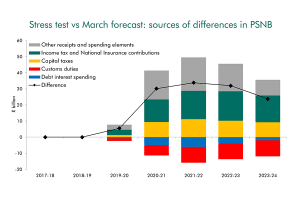OBR assesses fiscal risks: what might hit the public finances over the next five or 50 years?
Governments are there to manage society’s risks, but also risks to the public finances. Our second Fiscal risks report concludes that perennial issues of abrupt shocks, slower-building pressures and risks taken on by choice are largely as they were two years ago. But Brexit risks loom larger as ‘no deal’ is countenanced at the highest…


